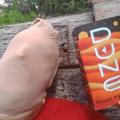jdavidhacker1 reviewed The Broken Kingdoms by N. K. Jemisin (The Inheritance Trilogy, #2)
None
3 stars
This was definitely an improvement over the first book in the series. It probably should have been the first book in the series...nothing from Hundred Thousand Kingdoms was necessary to understand or engage in this story, and quite frankly the characters and their development was a lot more interesting. There was also considerably less romantasy and ya vibes in this one. The world felt more detailed and alive interesting. We still don't really get enough detail to make some of the political/religious intrigue as engaging realistic as it could be, but again, definitely an improvement over hundred thousand kingdoms...which in hindsight feels like it should have been a shorter prequel to this released sometime after the fact.returnI'd say, if you want to read the Inheritance series at all, start here.
This was definitely an improvement over the first book in the series. It probably should have been the first book in the series...nothing from Hundred Thousand Kingdoms was necessary to understand or engage in this story, and quite frankly the characters and their development was a lot more interesting. There was also considerably less romantasy and ya vibes in this one. The world felt more detailed and alive interesting. We still don't really get enough detail to make some of the political/religious intrigue as engaging realistic as it could be, but again, definitely an improvement over hundred thousand kingdoms...which in hindsight feels like it should have been a shorter prequel to this released sometime after the fact.returnI'd say, if you want to read the Inheritance series at all, start here.











